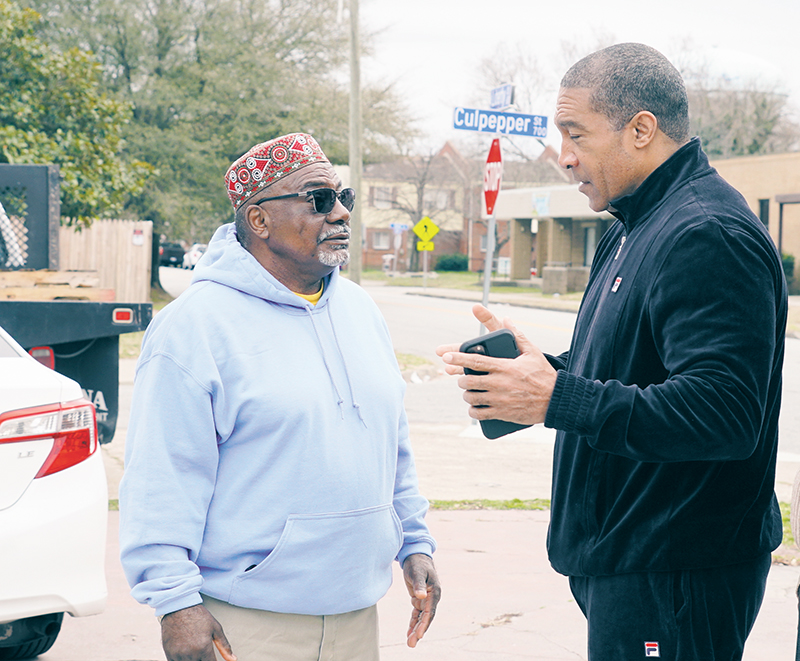Civil
Former Norfolk Chief On Traffic Stops, Ticketing, And De-escalating Tensions
Former Norfolk Police Chief Larry Boone discusses the importance of procedural justice and de-escalation techniques during traffic stops to improve police-citizen interactions and build trust between law enforcement and communities.

By Leonard E. Colvin
Chief Reporter
New Journal and Guide
Within a few weeks former Norfolk Police Chief Larry Boone will be moving to Urbana, Illinois where he will lead that city’s department.
Boone, Norfolk’s third Black Police Chief, had a 33-year career with NPD six of which he served as chief from 2016 to 2022.
Boone said Urbana’s city leaders hired him for his progressive and “21st Century policing policies” such as “Procedural Justice” which recently was highlighted in the “Proceedings of the National Academy of Sciences” involving police-citizen interaction during traffic stops.
That study looked at the outcome of the first 45 words a police officer utters while encountering a citizen during a traffic stop.
It found that escalating tension is nearly three times more likely to start when the first words are commands, such as “Keep your hands on the wheel” or “Turn the car off.”
However, the chance of escalating tensions, handcuffing, arrests, or violence was reduced when a police officer’s first words provided a reason for the stop.
To complicate the matter, a recent ProPublica analysis of millions of traffic citations found that households in majority Black and Hispanic zip codes received tickets at around twice the rate of those in White neighborhoods between 2015 and 2019.
The GUIDE contacted Boone to get a comment about the “45-seconds” study which is similar to one the NPD conducted in collaboration with Old Dominion University (ODU) during his tenure.
Boone said traffic stops are the most “prevalent” police-citizen contact.
They are also the most dangerous, he said, and explained there is a sense of “self-preservation” on the part of the officer and the citizen, especially those who live in “marginalized” and “over-policed” urban communities, that has destroyed their trust in law enforcement.
A 2017 research article written by ODU’s Department of University Relations defined the study as a
“(A) groundbreaking research collaboration between ODU and NPD (which) could provide a template for more positive interactions between citizens and police.
Mengyan Dai, ODU associate professor of sociology and criminal justice, received a grant of nearly $400,000 in late 2016 from the National Institute of Justice (NIJ) to examine the impact of “procedural justice” on interactions between police and citizens.
The three-stage study with the NPD was designed to test this concept during police stops in the city.
Dai, who began researching procedural justice a decade ago while working on his dissertation at the University of Cincinnati, said theory suggests that the use of procedurally fair behavior by police officers will lead to broad positive outcomes in police-citizen relationships.
“Procedural justice focuses on the actions of officers following proper procedure during interactions,” Dai said. “Theoretically, we know that if a citizen feels they are treated fairly during a stop by police, they are more likely to accept the outcome. In the long run, this could result in better relations between the community and police.”
To demonstrate how seriously the NPD took this initiative, the first of three stages of the study was an eight-hour seminar given to every member of the department on the four principles of procedural justice – giving citizens a voice in the process or allowing them to tell their story; remaining neutral in interactions; treating individuals with respect, and demonstrating trustworthiness of motive.
Boone said in 2017, “This project supports my efforts in 21st-century policing, encouraging trust and legitimacy, not only with procedural justice, but also through transparency, accountability, and honest recognition of avenues for improvement.”
Boone said that when he was Norfolk Police Chief, the candidates in NPD’s Academy were taught the art of procedural justice which was designed to deescalate tensions during the police-citizens interactions.
He said that the ODU Department of Public Administration, conducted an analytic review of a similar police-citizen interaction study based on body cam footage from NPD Officer cams.
He said both officers and citizens were allowed to tell their stories of what happened during the interaction.
According to the 2017 ODU article, “No one interaction between police and citizen will erase the suspicion and mistrust that have built up over many years in some communities across the United States.
“But if we use procedural justice properly, the belief is it will change the interactions from that point forward,” Kenter said.
Boone told the GUIDE that along with the utterance of the first 45 words, an officer’s demeanor plays a part in deterring an escalation of tension.
He said that when officers apply procedural justice, including being fair, telling drivers why they were stopped, and not dominating the conversation, trust can be built and tensions de-escalated that could lead to negative outcomes.














